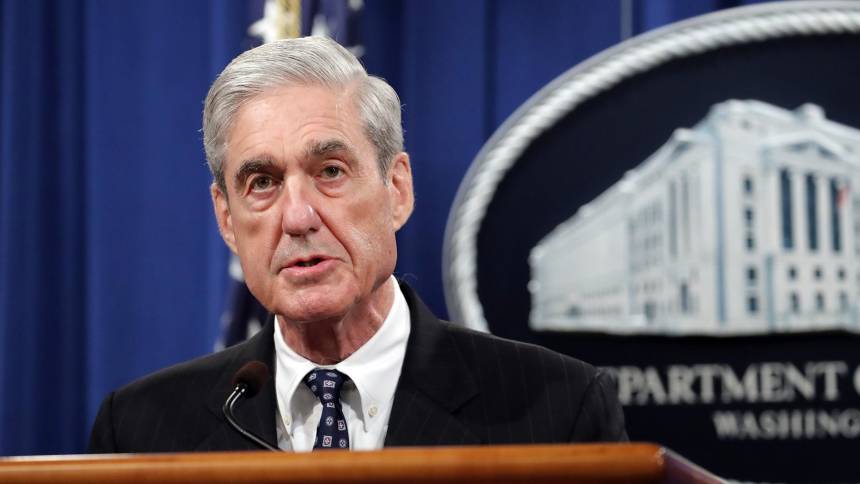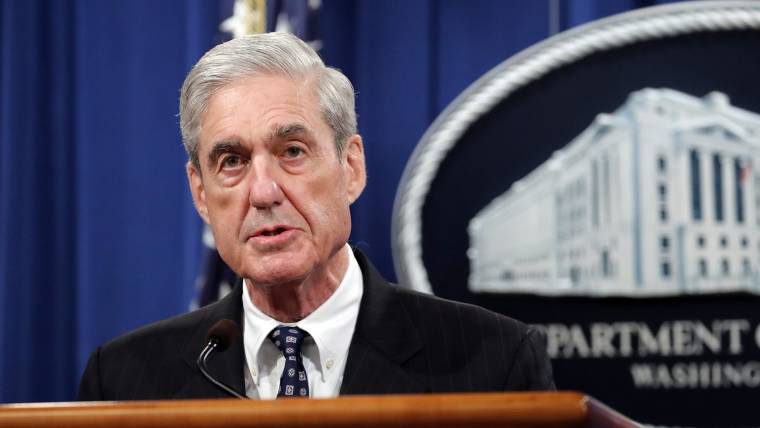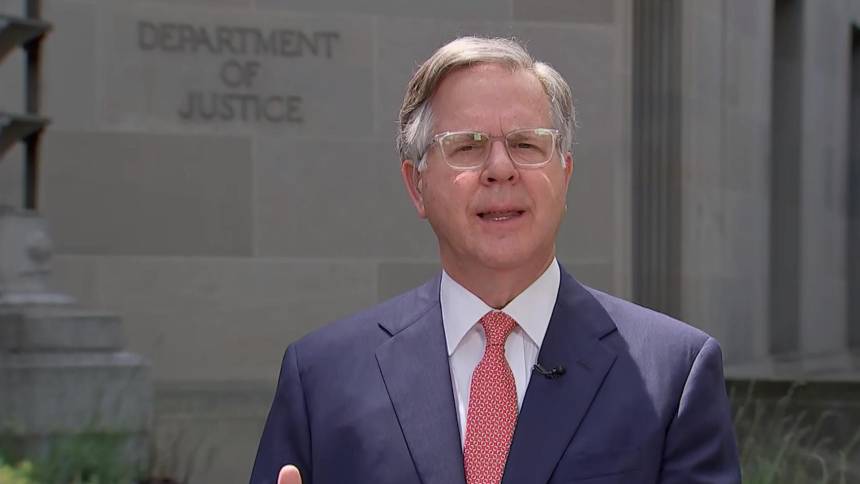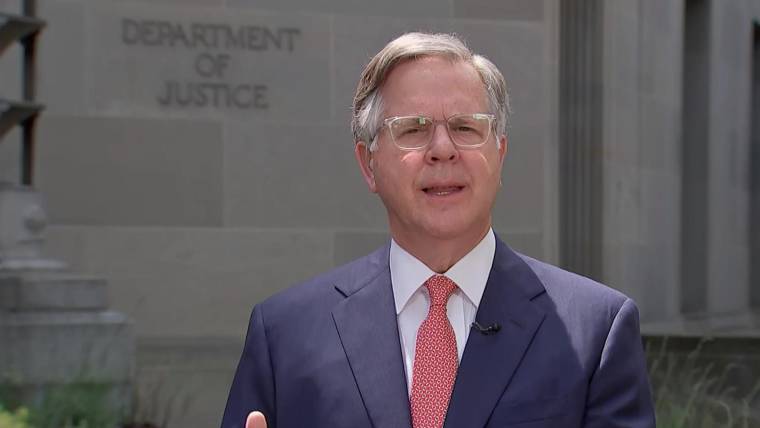Top stories
Web results
begin quote from:
4 hours ago - Special counsel Robert Mueller said on Wednesday that his report "speaks for itself" and that even if he were to testify before Congress he wouldn't provide any information "beyond what is already public."
2 hours ago - US Special Counsel Robert Mueller has said charging President ... Mr Trump wasn'texonerated, "charging the president" wasn't an option.
2 hours ago - Special counsel Robert Mueller says charging a president with a crime ... Trump tried to seize control of the Russia probe and force Mueller's ...
/ Updated
By Allan Smith and Adam Edelman
Special counsel Robert Mueller said on Wednesday that his report "speaks for itself" and that even if he were to testify before Congress he wouldn't provide any information "beyond what is already public."
"The report is my testimony," Mueller said at the Justice Department in his first comments on the two-year probe of Russian election meddling and possible obstruction by President Donald Trump.
Mueller said of his 448-page report: "We chose those words carefully and the work speaks for itself."
"I would not provide information beyond what is already public in any appearance before Congress," Mueller said.
NBC's Pete Williams analyzes Mueller's 'valedictory speech'
MAY 29, 201903:02
The former FBI director said he did not plan any further comment on the investigation or the report.
"Beyond what I have said here today and what is contained in our written work, I do not believe it is appropriate to speak further or comment," he said, adding he was "making this decision myself" and that nobody had tried to prevent him from appearing before Congress.
"No one has told me whether I can or should testify," he said.
Mueller, whose report did not come to a traditional prosecutorial decision on whether Trump obstructed justice, reiterated his conclusion.
"If we had had confidence that he clearly did not commit a crime we would have said so," Mueller said, implicitly refuting Trump's repeated statements that Mueller had exonerated him. "We did not, however, make a determination to whether the president did commit a crime."
The special counsel made it clear that he felt constrained from the beginning of his probe by Justice Department rules that prohibit the indictment of a sitting president. The method for charging and removing a president, he said, lies outside the criminal justice system, referring to the Constitution's provisions for impeaching and convicting a president.
Under longstanding Department of Justice policy, Mueller said, "a president cannot be charged with a federal crime while he is in office."
"That is unconstitutional," Mueller said. "Charging the president with a crime was therefore not an option we could consider."
Mueller, who also said he is resigning to return to private life, did not take questions from reporters after his roughly 10-minute statement. He said he was "speaking out today because our investigation is complete."
Mueller explained that while existing legal guidance "explicitly permits" investigating a sitting president, the guidance also says that accusing a president of committing a crime is governed by different rules.
"The Constitution requires a process other than the criminal justice system to formally accuse a sitting president of wrongdoing,” he said.
That comment — an apparent nod to the appropriateness of Congress handling such matters — is likely to touch off continued calls from Democrats to initiate impeachment proceedings.
Mueller, however, added that his report was also guided by "principles of fairness."
"It would be unfair to potentially accuse somebody of a crime when there can be no court resolution of the actual charge," he said. "That was Justice Department policy. Those were the principles under which we operated."
"And from them, we concluded that we would, would not reach a determination one way or the other about whether the president committed a crime," Mueller said. "That is the office's final position and we will not comment on any other conclusions or hypotheticals about the president."
When it came to discussing Moscow's interference in the 2016 election, Mueller was emphatic that Russian figures had — through "sophisticated cyber techniques" like hacking computer networks and email accounts and posing as Americans on social media — "launched a concerted attack on our political system."
"There were multiple, systematic efforts to interfere in our election. That allegation deserves the attention of every American," Mueller said.
A senior White House official said that the White House was notified on Tuesday night that Mueller might make a statement, but did not know the content of what Mueller would say. The official added that the White House made no attempt to stop Mueller from speaking.
Moments after Mueller's statement, Trump tweeted that the "case is closed."
Meanwhile, House Judiciary Committee Chairman Jerrold Nadler, D-N.Y., whose committee would be charged with initiating impeachment proceedings against Trump, indicated that Congress is ready to act.
“Given that Special Counsel Mueller was unable to pursue criminal charges against the President, it falls to Congress to respond to the crimes, lies and other wrongdoing of President Trump — and we will do so,” Nadler said in a statement released after Mueller's. “No one, not even the President of the United States, is above the law."
Download the NBC News app for breaking news and updates on Mueller's statement
Mueller has not made any comment on the investigation since he was named special counsel in May 2017. House Democrats are seeking to have him testify before Congress in the coming weeks. Last week, House Judiciary Committee Chairman Jerrold Nadler, D-N.Y., said Mueller was willing to testify but only in private.
Mueller's planned remarks come after a new book reportedly asserted that Mueller drew up a three-count obstruction of justice indictment against President Donald Trump before deciding to abandon it. Mueller did not comment on the book during his statement at the Justice Department.
In March, Mueller submitted to Attorney General William Barr his 400-plus page report on Russian interference in the 2016 presidential election, whether the Trump campaign or Trump associates conspired with Russia in those efforts and if Trump sought to obstruct justice.
Days later, Barr released a four-page summary of Mueller's report which the special counsel said "did not fully capture the context, nature, and substance" of his investigation. Trump used the Barr summary to claim he was exonerated in the weeks that followed before, in mid-April, Barr released a lightly redacted version of Mueller's report.
In his report, Mueller extensively detailed Russia's efforts to interfere in the 2016 election, multiple contacts between the Trump campaign and associates with Russians, and Trump's efforts to quash the probe. Mueller wrote that the evidence he reviewed was not enough to establish a Trump-Russia conspiracy while, on obstruction, he said he could not come to a traditional prosecutorial decision.
"Accordingly, while this report does not conclude that the President committed a crime, it also does not exonerate him," Mueller wrote, later adding that Trump's "efforts to influence the investigation were mostly unsuccessful, but that is largely because the persons who surrounded the President declined to carry out orders or accede to his requests."




No comments:
Post a Comment